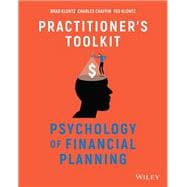Tools to help financial planners become more effective
Psychology of Financial Planning: Practitioner's Toolkit is a practical, hands-on companion resource to the authors' Psychology of Financial Planning. It brings assessments, reflection and exercises that helps the financial planner better understand their own biases and behaviors as well as those of their clients. The Practitioner’s Toolkit includes exercise related to all of the learning objectives in the Psychology of Financial Planning that are found on the CFP® Exam.
This Practitioner's Toolkit offers a collection of tools designed to expand on aspects of the companion book, including assessments and exercises financial planners can use with their clients. It guides readers through the application of concepts explored in the Psychology of Financial Planning and encourages discussion and sharing with clients and members of planning firms.
Readers will also find:
- Tools and strategies to assist the financial planner in understanding client and planner attitudes, values, and biases,
- Explorations of multicultural competence, behavioral finance, and helping client’s navigate crisis events across a broad range of circumstances and financial planning clients,
- Exercises that focus on resolving common sources of money conflict, avenues to get the client to take action, client goal-setting, and principles of effective communication and facilitating change.
Designed for current and aspiring financial planning professionals and educators in financial planning across roles and business models, The Psychology of Financial Planning: Practitioner’s Toolkit is a must-have on bookshelves of practitioners from firms large and small.








